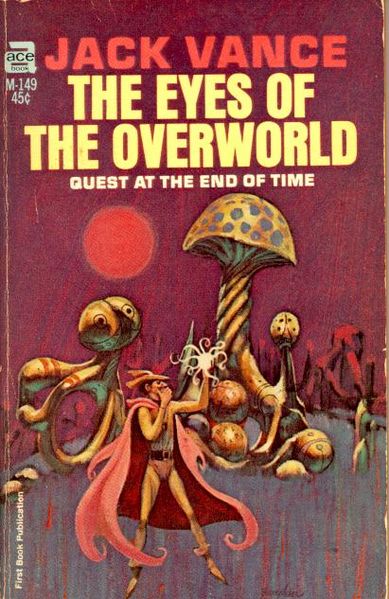

|
|
|
|
|
|
|
|
|
|
|
|
All magic and cleric spells
are similar in that the word sounds, when
combined into whatever patterns
are applicable, are charged with
energy from the Positive
|| Negative
Material Plane. When uttered, these
sounds cause the release
of this energy, which in turn triggers a set
reaction. The release of
the energy contained in these words is what
causes the spell to be forgotten
or the writing to disappear from the surface
upon which it is written.
The triggering action draws
power from some plane of the multiverse.
Whether the spell is an
abjuration,
conjuration,
alteration,
enchantment,
or whatever, there is a
flow of energy - first from the spell caster, then
from some plane to the area
magicked or enspelled by the caster. The
energy flow is not from
the caster per se, it is from the utterance of the
sounds, each of which is
charged with energy which is loosed when the
proper formula and/or ritual
is completed with their utterance. This
power then taps the desired
plane (whether or not the spell user has any
idea of what or where it
is) to cause the spell to function. It is much like
plugging in a heater; the
electrical outlet does not hold all of the electrical
energy to cause the heater
to function, but the wires leading from
it, ultimately to the power
station, bring the electricity to the desired
location.
Many spells also require
somatic motions in conjunction with words. The
spoken words trigger the
release of the magical energy, and the hand
movements are usually required
in order to control and specify the
direction, target, area,
etc., of the spell effects. When spell energy is released,
it usually flows to the
Prime Material from the Positive or Negative
Material Plane. To replace
it, something must flow back in reverse. The dissolution
and destruction of material
components provides the energy that
balances out this flow,
through the principle of similarity. Sometimes this
destruction is very slow,
as is the case with druidsĎ mistletoe. Those spells
without apparent material
components are actually utilizing the air exhaled
by the magic-user in the
utterance of the spell.
Release of word/sound-stored
energy is not particularly debilitating to
the spell caster, as he
or she has gathered this energy over a course of
time prior to the loosing
of the power. It comes from outside the spell
caster, not from his or
her own vital essence. The power to activate even
a first level spell would
leave a spell caster weak and shaking if it were
drawn from his or her personal
energy, and a third level spell would
most certainly totally drain
the casterís body of life!
Because spells tap power
from other planes, any improper casting is
likely to cause the spell
not to function (the heater is turned on, but you
havenít plugged it in, or
youíve plugged it in but not turned i t on) or to
malfunction (you held onto
the prongs of the plug when you tapped the
current, or you accidently
dropped the heater as you were plugging i t in,
or perhaps you plugged in
some other appliance or device by mistake).
Such happenings are covered
in the various chances for spell malfunction.
If your players inquire
as to how spells work, or fail to do so, you can
explain, without difficulty,
the precepts of the AD&D magic spell
systems.
(For background reading
you can direct campaign participants to Vanceís
THE EYES OF THE OVERWORLD
and THE DYING EARTH as well as to
Bellairís THE FACE IN
THE FROST.)
Q: Page 40 of the
DMG refers to "various
chances for spell malfunction."
What are these chances,
and where
can they be found?
A: There is no spell
malfunction table, but
the AD&D 1st Edition
game is liberally
peppered with spell malfunction
chances.
Saving throws can partially
or completely
negate a spell, low wisdom
scores can
affect clerical spell-casting,
casting a spell
from a scroll is not a sure
thing if the
caster?s knowledge is incomplete,
and
magic resistance can play
havoc with
spells. Page 40 refers to
these miscellaneous
rules.
(154.96)
![]()
Reduce - Reuse - Recycle
Quote:
Originally posted by Harlock
Mr. Gygax, do you have the
personality to cast real spells yet?

"I've got that magic touch,
it makes you thrill so much.
"It casts a spell, it rings
a bell, that magic touch."
Real spells? You mean like dizzy spells, coughing spells, fainting spells? Dry spells? Wet spells? Heat spells? Cold spells? As far as I know, that's about the extent of reality in regards spells.
If there were actually magic spells, and I could use same, do you suppose I'd be answering these kinds of questions?
Heh,
Gary
Quote:
Originally posted by sword-dancer
A few other questions from
german threads, not from me.
quote:
--------------------------------------------------------------------------------
Why did you choose the vancian
magic system ?
--------------------------------------------------------------------------------

I chose to use a system of magic inspired by the worls of Jack Vance because it fit the whole of the game I devised. For example, think of an archer with a quiver of arrows. When one is shot, it is gone. Magic spells, more potent than arrows, are much the same. So archers need to select their arrows before going forth to battle, so too the m-us in the game.
Gary